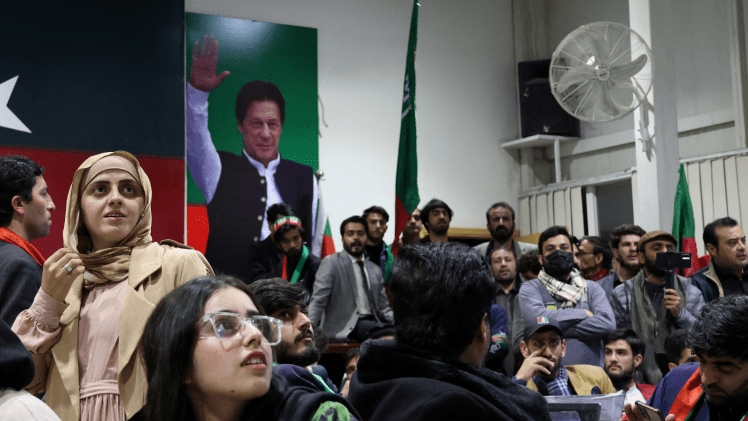Table of Contents
What has happened
Pakistan is currently dealing with the aftermath of controversial elections, and the resulting political chaos is posing a threat to the country’s $3bn deal with the International Monetary Fund (IMF). This deal is crucial for Pakistan’s economic stability, according to analysts.
On Thursday, the IMF announced that Pakistan’s interim government had been successful in maintaining economic stability. Julie Kozack, the IMF’s communications chief, stated that the interim government had achieved fiscal targets and had also protected the social safety net.
“We are eager to collaborate with the new government to establish policies that will ensure Pakistan’s macroeconomic stability and prosperity for all citizens,” said Kozack. However, these remarks from the IMF arise amidst the upcoming swearing-in of a new government in Pakistan, following the general election held earlier this month. The election has been plagued by allegations of rigging and manipulation on a large scale.
Pakistan’s Election Controversy
Former Prime Minister Imran Khan, who founded the Pakistan Tehreek-e-Insaf (PTI) party, has drawn a link between allegations of electoral fraud and a loan from the International Monetary Fund (IMF). He has asked the IMF to conduct an audit of the elections before proceeding with the deal.
“Imran Khan will issue a letter to the IMF. The charters of the IMF, EU, and other organizations stipulate that they can function or provide a loan to a country only if there is good governance,” said Khan’s lawyer and Senator Ali Zafar after meeting the ex-premier at Rawalpindi’s Adiala Jail on Thursday.
Khan is currently in jail over a series of convictions in cases involving charges ranging from corruption to leaking secret documents. Pakistan signed a nine-month standby agreement with the IMF last year, which will expire early next month. Securing another long-term plan is seen as a priority for the next government.
The elections held on February 8 in Pakistan resulted in a split mandate. The candidates supported by the PTI won 93 seats in the National Assembly, while the main opponents of the party, the Pakistan Muslim League-Nawaz (PMLN) and Pakistan Peoples Party (PPP), secured 75 and 54 seats respectively.
Despite the PTI winning the highest number of seats, they were denied their electoral symbol, a cricket bat, weeks before the elections. As a result, the party had to field candidates as independents. Additionally, the PTI faced a nationwide crackdown that hindered its campaign efforts.
However, the PMLN, PPP and their smaller allies have now come together to form a coalition government. The newly formed government is expected to have its members take oaths next week.
In 2022, Khan was removed from office through a no-confidence motion. Many analysts believe that he originally came to power in 2018 with the support of Pakistan’s powerful military establishment, but they eventually fell out.
The Pakistan Tehreek-e-Insaf (PTI) has claimed that there has been widespread manipulation in the counting and results of the election. They have announced that they will continue with both street protests and legal cases to reclaim what they believe is a stolen mandate.
However, Lahore-based economist Hina Shaikh has stated that this political uncertainty will not have any impact on the International Monetary Fund’s (IMF) approach. The IMF has already shown its willingness to work with the new government and any efforts by Khan would not achieve any results.
According to Shaikh, firstly, the PTI’s efforts would have no official consequences, and secondly, it would not be in the interest of Pakistan or the IMF to end financial support. Pakistan has several payments that are due in the next two months and requires IMF assistance to stay afloat and continue leveraging other sources of revenue.
Pakistan’s Economic Crisis
Economists have stressed the importance of extending the IMF deal for Pakistan. They have warned that failure to address the country’s enormous economic challenges could lead to a default that affects its 241 million people.
Currently, Pakistan’s foreign reserves are approximately $8bn, which would only cover eight weeks of imports. The Pakistani rupee has depreciated by over 50% against the US dollar in the past two years.
The inflation rate, which reached an all-time high of almost 38% last year, is currently at nearly 30%. Furthermore, high tariffs on electricity, gas, and other essential commodities are draining household incomes.
Pakistan must negotiate a new plan with the IMF once the new government comes to power, given its looming debt obligations. According to a recent report by an Islamabad-based think tank, Pakistan’s total external and internal debt amounts to $271bn, making its debt obligations unsustainable.
A report from the United States Institute of Peace revealed that Pakistan will have to repay $77.5bn in external debt by June 2026. This is a significant burden for a $350 billion economy.
Pakistan’s central bank has stated that it needs more than $6bn to service its debt obligations by the end of the current fiscal year, which is on June 30.
Uzair Younus, a principal at the US-based advisory firm The Asia Group, emphasized the importance of continuing the IMF loan program, stating that Pakistan’s economy cannot afford politics when it comes to the next IMF deal. He also warned that any delay due to politics or a staring contest between the next finance minister and the IMF could rapidly fuel economic uncertainty, currency pressure, and heightened default risk.

1 Comment
Pingback: Modi Congratulates Shehbaz Sharif on Second Term: Strengthening Diplomatic Relations. - INPAC Times